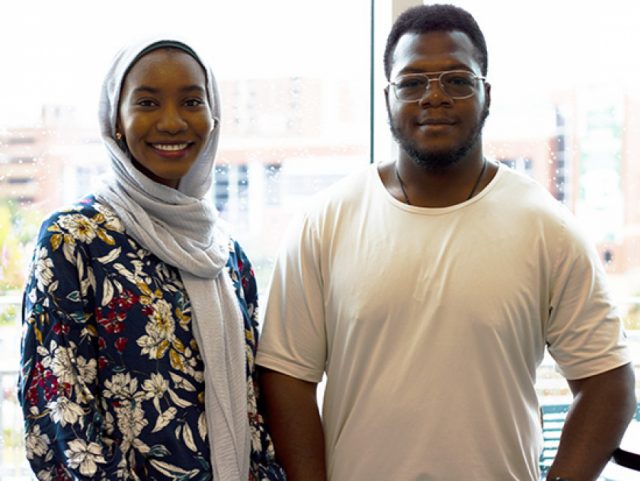By Alicia Rohan
UAB News
Two students from the University of Alabama at Birmingham have been accepted into the Stop the Addiction Fatality Epidemic Collegiate Recovery Leadership Academy. Maysa Mohmoud, a senior psychology major with a minor in social work, and Demetrius Smith, a junior psychology major with a minor in African American studies and art, were among 50 students into the program this year.
Open to students in recovery and recovery allies, this, yearlong fellowship cultivates future leaders from college campuses around the nation. They attend prestigious conferences and work with assigned mentors to create projects to positively impact their campuses.
Mohmoud, a native of Hoover, Alabama, is applying to UAB’s Master of Social Work program to pursue a career in advocacy for underrepresented groups at risk, particularly within recovery spaces. Mohmoud was introduced to the field of collegiate recovery through a peer education class, during which she realized she might have a drug issue herself. A discussion with her professor led Mohmoud to her first Collegiate Recovery Community meeting. Mohmoud celebrated one year of sobriety October 2019 and says this is thanks to the Collegiate Recovery Community on campus.
“I applied for the SAFE Leadership Academy after walking into my first couple of CRC meetings, where I did not see a single person who looked like me,” Mohmoud said. Through her impact project with SAFE, Mohmoud looked at why people in marginalized communities often do not seek recovery assistance on campus. Her project enabled her to encourage diversity within the UAB’s CRC.
Mohmoud is the lead promoter of wellness through UAB Wellness Promotion, where she works to raise awareness and prevent interpersonal violence and substance abuse.
“Being in the SAFE community helps me see what methods work and what students really need on campus,” Mohmoud said. “Involvement in this community has helped me realize the risk factors of substance misuse, allowing me to educate future clients before their issues escalate.”
Smith
Smith, a native of Tuscaloosa, Alabama, will begin pursuing a doctoral degree in clinical psychology after graduation. For Smith, his journey into collegiate recovery began when he decided to tackle his mental health issues. A friend influenced him to try harm reduction, a practice that diminishes the harmful effects of substance abuse on a person’s health, social and economic well-being. Smith was later introduced to the CRC by a supportive professor.
Smith found the SAFE Collegiate Recovery Leadership Academy during his mission to delve deeper into his interests. Smith agrees that the campus’s diversity is not reflected in the CRC, and this made him a bit uncomfortable when he attended his first meetings.
With his impact project, Smith aims to increase the awareness and comfortability of the CRC by sharing the stories and support of current members via physical messages around campus. He created posters that follow stories of the humans who are in recovery to complement the social media campaigns the CRC has implemented. The posters showcase real people who have utilized the CRC to recover and highlights the opportunities for success within the community. Smith has noticed that many students and faculty are not aware of the CRC, and he plans to change this.
He believes the SAFE Project and the CRC have increased his self-awareness.
“I feel like it is important for me to be as comfortable with all aspects of myself as I can be in order to help other people and to succeed in my career as a clinical psychologist,” Smith said. “Involvement as a student and now mentor of the CRC has allowed me this opportunity. The SAFE fellowship will help me build on my self-discovery to help others who suffer from addiction.”




